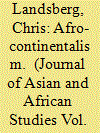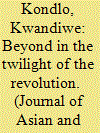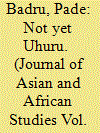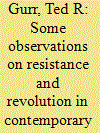|
|
|
Sort Order |
|
|
|
Items / Page
|
|
|
|
|
|
|
| Srl | Item |
| 1 |
ID:
115262


|
|
|
|
|
| Publication |
2012.
|
| Summary/Abstract |
In his book In the Twilight of the Revolution (2009), which is also the subject of this review article, Kwandiwe Kondlo argues inter alia that: '. . . the Africanist orientation of the PAC [Pan-Africanist Congress] was appropriated in the policies of [South Africa's] . . . new democratic government(s), especially during the period of former President Thabo Mbeki' (2009: 282). This author critically examines Kondlo's assertion in the context of South Africa's post-apartheid period and argues that successive South African governments played pivotal roles in helping to shape Africa's evolving inter-state system through diplomacy and the politics of partnership. In that regard, he argues that South Africa's aim is to promote Continentalism (agreements or policies that favour regionalization or regional co-operation between states, or deep and regulated forms of regional co-operation between nations within a continent), a new post-Cold War foreign policy paradigm on the continent, which will assist in the consolidation of the idea of a union of African states that dawned with the birth of the African Union (AU), created to replace the Organization of Africa Unity (OAU). He insists that, in the context of Kondlo's assertion, African Continentalism, as opposed to Pan-Africanism, which advocates the amalgamation of existing independent African states into a bloc, represents a process that encourages African states to band together to create new norms, principles, institutions, and political structures, and agree to live by such structures and in harmony with each other. To buttress his argument, the author examines Thabo Mbeki's African Renaissance project as the corollary of African Continentalism on which South Africa's Africa policy was anchored during and after his presidency.
|
|
|
|
|
|
|
|
|
|
|
|
|
|
|
|
| 2 |
ID:
113764


|
|
|
|
|
| Publication |
2012.
|
| Summary/Abstract |
The debate about the outcome of the negotiated settlement that ended South Africa's anti-apartheid struggle rages on. The author of this article, who is also on the side of the debate that argues that South Africa's Black majority was short-changed by the outcome, affirms that argument here, and insists that negotiated settlement amounts to 'surrendered revolution' that allowed White South Africans to retain monopoly of the economy. He enjoins 'progressive forces' in South Africa to remobilize and finish the 'unfinished revolution' that will achieve a different outcome, which will right the historic economic wrong that consigned and keeps South Africa's Black majority in crushing poverty.
|
|
|
|
|
|
|
|
|
|
|
|
|
|
|
|
| 3 |
ID:
069835


|
|
|
| 4 |
ID:
113760


|
|
|
|
|
| Publication |
2012.
|
| Summary/Abstract |
In Kwandiwe Kondlo's In the Twilight of the Revolution (2009), which examines the role of the Pan-Africanist Congress (PAC) of Azania in South Africa's anti-apartheid struggle as the backdrop, this article surveys the momentum of social revolution in Sub-Saharan Africa during the decolonization era that started in the mid-20th century and ended with South Africa's transition to a multi-racial democracy in 1994. It argues that the failure of the African elite to achieve a genuine independence from both colonial rule and South Africa's apartheid system is largely because of inconsistent nationalist ideologies and the detachment of the African elite from the popular struggles of the people, which could have resulted in the revolutionary overthrow of the colonial state and the dawn of more progressive and autonomous states all across Black Africa. It concludes that this failure led to the continuing instability of the post-colonial states across Africa and, in South Africa, to the achievement of a particular form of multi-racial democracy with very little or no change to the real politics of apartheid and Boer domination.
|
|
|
|
|
|
|
|
|
|
|
|
|
|
|
|
| 5 |
ID:
113761


|
|
|
|
|
| Publication |
2012.
|
| Summary/Abstract |
This unique essay, in which the author reminisces on and draws from his involvement as an expert witness in one of South Africa's apartheid era political trials, is testimony that ideas live independently of their creators. Although the author was initially mentioned in the trial by the prosecution, which claimed that his book, Why Men Rebel, provided a four-stage model of revolutionary strategy for cadres of the Black People's Convention (BPC) and the South African Students' Organization (SASO), his subsequent testimony was for the defense, and was used to counter the prosecution. Here, the author applies the Why Men Rebel theory to South Africa to assess the issues raised in Kwandiwe Kondlo's book, In the Twilight of the Revolution (2009), which examines the role played by the Pan-Africanist Congress (PAC) as well as the resultant multi-racial democratic dispensation in post-apartheid South Africa in South Africa's anti-apartheid struggle. The essay and the revelations it encompasses are quite deep and relevant for a critical understanding of the trend of politics in post-liberation South Africa, in particular, and post-colonial Africa in general.
|
|
|
|
|
|
|
|
|
|
|
|
|
|
|
|
|
|
|
|
|